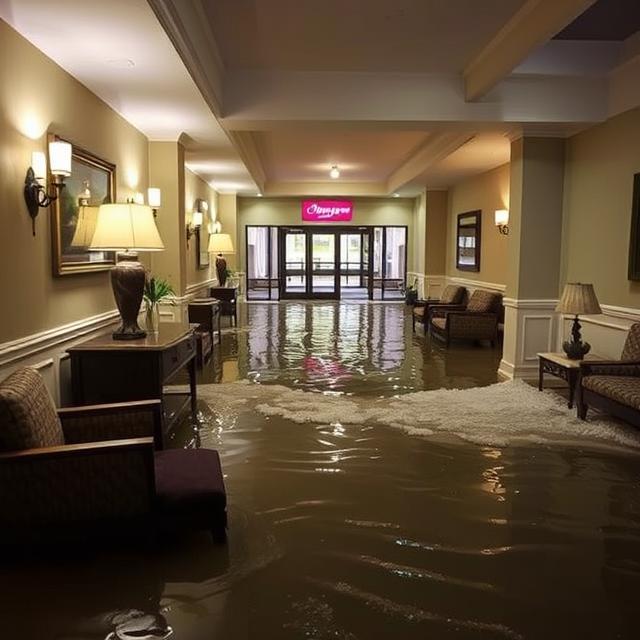The Impact of Pipe Bursts on Hotels and the Importance of Preparedness

Strong 8k brings an ultra-HD IPTV experience to your living room and your pocket.
Introduction
Imagine checking into a hotel, excited for a relaxing stay, only to find the lobby flooded and rooms unavailable due to a burst pipe. This scenario unfolded at the Hampton Inn and Suites in Mystic in early January 2014, when a frozen pipe burst in the attic, sending 7,500 gallons of water cascading through 11 rooms and the lobby. Such incidents, while rare, can significantly disrupt hotel operations, damage reputation, strain customer relationships, and erode trust. This article explores how pipe bursts affect hotels and why having an emergency plan and partnerships with professional restoration services are critical for mitigating these impacts.
The Immediate Impact of Pipe Bursts on Hotel Operations
When a pipe bursts, the immediate consequences can be devastating. At the Hampton Inn and Suites, the burst pipe, which occurred on a Sunday in early January 2014, flooded 11 rooms on the second and third floors and turned the lobby into what the general manager, Melissa Schlatter, described as a scene where "it was raining." The hotel was forced to evacuate guests, disrupting their stays and halting normal operations. This sudden closure affected more than just the damaged areas; it impacted the hotel’s ability to serve guests, leading to canceled reservations and lost revenue.
The operational challenges include:
Room Availability: With 11 rooms out of service, the hotel’s capacity was reduced, limiting its ability to accommodate guests. However, the quick action to wall off damaged areas allowed the hotel to reopen by the following Monday with over 80 unaffected rooms and suites.
Facility Disruptions: The flooded lobby required temporary flooring and a reduced operational space, affecting the guest check-in experience. Critical areas like the front desk were protected by quick-thinking maintenance staff who used tarps, but the overall functionality was compromised.
Staff Strain: Crews worked around the clock, as Schlatter noted, with progress like fresh paint appearing overnight. This intense effort, while effective, places significant pressure on staff to restore normalcy.
The Ripple Effect on Hotel Performance
A pipe burst doesn’t just disrupt operations; it can have lasting effects on a hotel’s financial and operational performance. The immediate costs include repairs, such as replacing damaged drywall, flooring, and furniture, and hiring cleanup crews. For the Hampton Inn, the flooded atrium and rooms required extensive repairs, though the breakfast area and sundry store remained undamaged, allowing partial operations to resume.
Long-term performance impacts may include:
Revenue Loss: Evacuations and reduced room availability lead to canceled bookings and lost income. Even after reopening, the hotel may face challenges regaining full occupancy if guests perceive ongoing issues.
Increased Operational Costs: Temporary measures, like installing temporary flooring or rerouting guest services, add to expenses. Additionally, the need for rapid repairs can lead to overtime costs for staff or premium rates for contractors.
Remodeling Opportunities: On a positive note, incidents like this can provide a chance to upgrade facilities. Schlatter expressed excitement about getting "new stuff" during the rebuild, which could enhance the hotel’s appeal in the long run.
Damage to Reputation and Customer Relationships
A hotel’s reputation hinges on its ability to provide a seamless, comfortable experience. A pipe burst can tarnish this image, especially if guests face inconvenience or perceive the hotel as unprepared. At the Hampton Inn, the swift response ensured that new guests arriving after the cleanup might not even notice the incident, as Schlatter noted: "If they never get a look behind this door, they’ll never even know what happened." However, for those evacuated or affected, the experience could linger.
Key impacts on reputation and customer relationships include:
Guest Inconvenience: Evacuated guests may feel frustrated or unsafe, leading to negative reviews or reluctance to return. The emotional toll of disrupted plans, whether for vacations or business trips, can strain customer loyalty.
Public Perception: News coverage, like the report from News 8’s Tina Dittel, can amplify the incident, potentially deterring future guests. A hotel’s ability to manage the narrative and demonstrate resilience is critical.
Trust Erosion: Guests expect hotels to be reliable sanctuaries. A visible failure, like a flooded lobby, can undermine trust in the hotel’s maintenance and preparedness, making guests question its reliability.
Rebuilding Trust Through Effective Response
The Hampton Inn’s response offers valuable lessons in rebuilding trust. By walling off damaged areas, protecting critical systems like front desk computers, and reopening within a week, the hotel minimized disruption. Guests could check in as usual, and the unaffected areas maintained a sense of normalcy. This rapid recovery likely helped preserve trust among returning guests.
To rebuild and maintain customer trust, hotels can:
Communicate Transparently: Inform guests about the incident, the steps being taken, and expected timelines for full recovery. Transparency reassures guests that the hotel is in control.
Offer Compensation: Providing discounts, refunds, or complimentary services to affected guests can mitigate frustration and demonstrate goodwill.
Showcase Improvements: Highlighting upgrades, like the new paint or remodeled areas at the Hampton Inn, can turn a negative incident into a positive story of renewal.
The Importance of Emergency Preparedness
The Mystic incident tells us why hotels must have robust emergency plans for pipe bursts and similar accidents. An effective plan can mean the difference between a swift recovery and prolonged disruption. Key components of an emergency plan include:
Proactive Maintenance: Regular inspections of plumbing systems, especially in colder climates where pipes are prone to freezing, can prevent bursts. The Hampton Inn’s pipe burst was triggered by frigid temperatures in early January 2014, highlighting the need for winterization measures.
Rapid Response Protocols: Clear procedures for evacuating guests, securing critical areas, and initiating cleanup are essential. The quick action by the maintenance worker to protect computers with a tarp exemplifies the value of preparedness.
Guest Communication Plans: A strategy for informing guests about disruptions and alternative arrangements helps maintain trust and minimizes confusion.
The Value of Partnerships with Water Damage Restoration Companies
While not explicitly mentioned in the news piece, the scale of the cleanup at the Hampton Inn suggests the involvement of professional water damage restoration services. Partnering with such companies is crucial for hotels to manage large-scale incidents effectively. These professionals bring:
Expertise and Equipment: Restoration companies have specialized tools and knowledge to extract water, dry structures, and prevent mold, ensuring a thorough recovery.
Speed and Efficiency: Rapid response, as seen in the Mystic case where crews worked overnight, minimizes downtime. A pre-existing contract ensures immediate access to these services.
Long-Term Protection: Professionals can assess and mitigate hidden damage, preventing future issues that could further harm the hotel’s reputation or operations.
Having a contract with a reputable water damage restoration company allows hotels to act swiftly, reducing the financial and reputational toll of incidents like pipe bursts. It also signals to guests that the hotel is prepared for emergencies, reinforcing trust.
Conclusion
A pipe burst, like the one at the Hampton Inn and Suites in Mystic in January 2014, can disrupt hotel operations, strain finances, and challenge guest trust. However, with quick action, transparent communication, and strategic partnerships, hotels can recover and even improve. Emergency preparedness plans and contracts with water damage restoration companies are not just operational necessities—they are investments in a hotel’s resilience and reputation. By learning from incidents like this, hotels can ensure they remain a reliable haven for guests, no matter the challenge.
Note: IndiBlogHub features both user-submitted and editorial content. We do not verify third-party contributions. Read our Disclaimer and Privacy Policyfor details.


